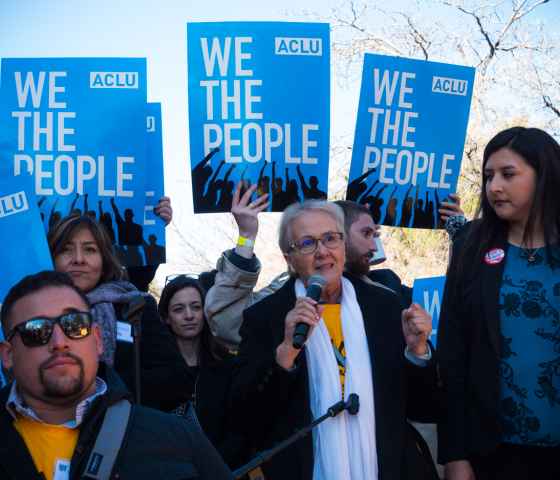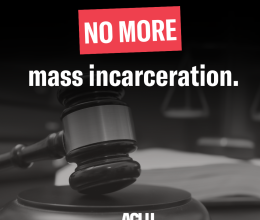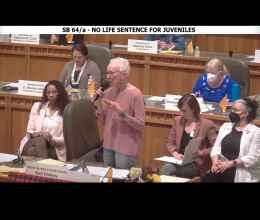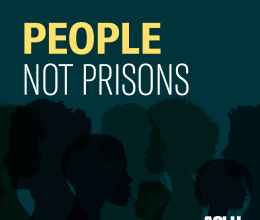On June 29, Franky Gonzales left the Bernalillo County Clerk’s office with tears streaming down his face. The reserved 52-year-old Albuquerque resident had walked into the office disenfranchised, barred from voting for more than a decade due to past felony convictions, and walked out with his voting rights restored, voiceless no more.
Ever since completing the probation that followed his five year prison sentence for armed robbery, he has worked to restore his voting rights under a New Mexico law that reenfranchises ex-offenders who have served their sentences and completed parole or probation. But every time he started the process, he was turned away and told he needed more documentation to prove he was no longer on probation or parole. While some aspects of living with a felony conviction became almost normal for Franky—losing jobs because of his record, getting rejected for housing after a rental office ran a background check—he never got used to not being able to vote.
“For four years they gave me the same run around,” he said. “I called probation and parole. I called Santa Fe. It was frustrating. To some people, voting rights aren’t a big deal, but for me it is huge. It makes you feel like you matter. Without the right to vote you get this less-than feeling.”
Franky regained his voting rights, in part, thanks to his involvement in the ACLU of New Mexico’s Smart Justice campaign, part of an ambitious nationwide effort by the ACLU to reform our broken criminal justice system. The Smart Justice Campaign is working to reform unfair and extreme sentencing laws, overhaul an unjust bail system that creates income-based incarceration, challenge prosecutorial abuse, and end the collateral consequences that are imposed on people living with a criminal record. The campaign seeks to center the stories and voices of people like Franky Gonzales, whose lives and families are personally affected by our criminal justice system.
Franky got involved with the ACLU’s Smart Justice project because he wants to work toward reforms that address the underlying causes of criminal activities like addiction and mental health issues. Part of Smart Justice’s strategy to eliminate racial disparities in the criminal justice system and reduce the number of people in our jails and prisons involves promoting evidencebased strategies, such as access to drug treatment and mental health services, to reduce crime and make communities safer.
Franky is heavily involved with a 12-step program, and spends much of his time spreading messages of hope and recovery to other addicts.
“It is cheaper to treat the disease of addiction and behavioral health issues than to incarcerate,” he said. “It would make the community safer, save taxpayers some money, and get people the help they need.”
He counts the restoration of his voting rights as an example of what one can achieve with a little patience and perseverance.
“It is something I can take back to other addicts who are incarcerated,” he said. “Now, I am getting things restored.”
Struggling to restore voting rights or navigate the countless other obstacles created by a felony conviction isn’t unique or uncommon. Franky’s situation is only unique in that his involvement with Smart Justice meant he worked in close contact with ACLU of New Mexico Senior Policy Strategist Paul Haidle, who, as an expert on criminal justice issues, was able to accompany Gonzales to the county clerk’s office to help answer any questions or explain what may have led to the denial of Franky’s voting application.
“I’m really happy for Franky and relieved that he can finally vote, but it shouldn’t have taken having a lawyer with him to make this happen,” said Haidle. “For people with a record, registering to vote is too complicated in New Mexico and keeps many people like Franky from having a voice in our political system. Part of Smart Justice’s goal is to tear down the barriers that keep people from moving forward with their lives, such as housing, employment, and restoration of voting rights.”
These issues affect a broad swath of New Mexicans. One in three New Mexicans have a criminal record, which translates to approximately 530,000 people who must deal with the 680 collateral consequences that often accompany a criminal record or conviction in the state. While the most common collateral consequences created by a criminal record may be loss of voting rights and difficulty in finding safe housing and gainful employment, a conviction can also make it hard to adopt a child, obtain a professional licensure, attend school and execute an estate.
Albuquerque resident Rory Wolf knows all about these obstacles. Since the mid-80’s, Rory has been in and out of prison five times. He believes he has finally found a way forward that will provide him enduring stability — a career path in social work. He chose social work because he believes that with his lived experiences and academic understanding, he could effectively help people to address addiction and other issues that lead to incarceration.
However, he may have to reevaluate his current career path after New Mexico Highland’s University officials denied his application for the school’s social work program. Although school officials didn’t give a reason for their denial, Rory believes it had something to do with his criminal record.
Rory, who is in his early sixties, said his situation highlights the need for criminal justice reforms that would remove barriers obstructing those working to transition from the custody of the state’s penal system to that of a productive community member. Besides making it easier for people to find jobs and go to school, removing those barriers would be a good first step to making communities safer.
“If this would have happened 20 years ago, I would have said (expletive) it and went back to getting high and breaking the law,” he said. “But now I don’t give up. If the door is closed, I will find a way to wiggle it open.”
This article originally appeard in the 2018 spring edition of The Torch.
This article originally appeard in the 2018 spring edition of The Torch.







